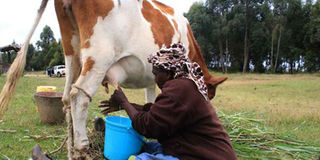Dairy board plans sacco model akin to matatus

Lucy Wanjiku milks her cow at Endarasha in Nyeri County on June 29, 2016. The Kenya Dairy Board Managing Director Margaret Rugut said the saccos will enable traders to self-regulate, access credit facilities and equipment. PHOTO | JOSEPH KANYI | NATION MEDIA GROUP
What you need to know:
- It is betting on these structures to ensure compliance with rules and as a way of increasing access to input by farmers.
- Through the initiative, traders will come up with means of ensuring that players comply with the dairy sector regulations.
The dairy industry regulator is pushing the sacco model akin to that in the matatu industry among milk traders to streamline and transform the sector.
It is betting on these structures to ensure compliance with rules and as a way of increasing access to input by farmers.
The Kenya Dairy Board Managing Director Margaret Rugut said the groups will enable traders to self-regulate, access credit facilities and equipment.
“Most of the traders’ groups have been informal, but we are already assisting them to set up structures,” she said.
Through the initiative, traders will come up with means of ensuring that players comply with the dairy sector regulations. The board will provide guidance on how they will operate.
“By law, most of these groups are not being recognised, that is why we want to formalise them. They will be able to purchase the equipment, acquire licences or comply with the regulations apart from enjoying the economies of scale,” she said.
Mrs Rugut said the board was working closely with counties to assist in development of dairy-friendly regulatory environment and policies.
“One of the key challenges faced by many farmers all over the country is that they have been slow in changing their traditional ways of farming to adopting the latest technologies and good agricultural practices,” said the regulator head.
The MD said the board is also promoting adoption of the school milk programme in counties to create market.
“Based on lessons learnt from previous school milk programme, the board is working with the counties and development partners have embarked on sustainable county based school milk programmes. Mombasa and Migori counties have already started their county programmes,” she said.
At the end of the year, the agency expects to have more than 10 counties on board.
“The pull effect of these programmes is provision of a ready market for the farmers’ milk throughout the school calendar,” said Mrs Rugut.
The dairy industry has been one of the fastest growing in the economy averaging at over 5 per cent per year. It currently contributes 4.5 per cent to the country’s GDP and 44 per cent of the agricultural GDP.
It is estimated that 55 per cent of milk produced is marketed while 45 per cent is consumed at the farm.





